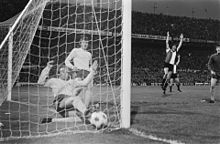The 1974 UEFA Cup Final was played on 21 May 1974 and 29 May 1974 between Tottenham Hotspur of England and Feyenoord Rotterdam of the Netherlands, to determine the champion of the 1973–74 UEFA Cup. Feyenoord won 4–2 on aggregate. Tottenham supporters rioted during the second leg in Rotterdam, which started after Feyenoord scored towards the end of the first half and continued into the second half.[1]
 | |||||||
| |||||||
| on aggregate | |||||||
| First leg | |||||||
|---|---|---|---|---|---|---|---|
| |||||||
| Date | 21 May 1974 | ||||||
| Venue | White Hart Lane, London | ||||||
| Referee | Rudolf Scheurer (Switzerland) | ||||||
| Attendance | 46,281 | ||||||
| Second leg | |||||||
| |||||||
| Date | 29 May 1974 | ||||||
| Venue | De Kuip, Rotterdam | ||||||
| Referee | Concetto Lo Bello (Italy) | ||||||
| Attendance | 59,317 | ||||||
Route to the final
editIn the preceding five rounds of the competition, Tottenham had never been seriously threatened with elimination, as the London-based club outscored their opponents by a total of 29 goals to 8 en route to the final. In contrast, Feyenoord Rotterdam won several narrow victories in their cup ties: they advanced on away goals against Belgian side Standard in the third round and needed extra time in the return leg to beat Polish club Ruch Chorzów in the quarter-final. Additionally, leading up to the final, Feyenoord had won only one out of five legs that were played away from their home ground, De Kuip.
This marked the second time in three years that Spurs had reached the final of a UEFA Cup, having defeated fellow English side Wolves in the inaugural final.
| Tottenham Hotspur | Round | Feyenoord | ||||||
|---|---|---|---|---|---|---|---|---|
| Opponent | Agg. | 1st leg | 2nd leg | Opponent | Agg. | 1st leg | 2nd leg | |
| Grasshoppers | 9–2 | 5–1 (A) | 4–1 (H) | First round | Öster | 5–2 | 3–1 (A) | 2–1 (H) |
| Aberdeen | 5–2 | 1–1 (A) | 4–1 (H) | Second round | Gwardia Warsaw | 3–2 | 3–1 (H) | 0–1 (A) |
| Dinamo Tbilisi | 6–2 | 1–1 (A) | 5–1 (H) | Third round | Standard Liège | 3–3 (a) | 1–3 (A) | 2–0 (H) |
| 1. FC Köln | 5–1 | 2–1 (A) | 3–0 (H) | Quarter-finals | Ruch Chorzów | 4–2 (a.e.t.) | 1–1 (A) | 3–1 (a.e.t.) (H) |
| Lokomotive Leipzig | 4–1 | 2–1 (A) | 2–0 (H) | Semi-finals | VfB Stuttgart | 4–3 | 2–1 (H) | 2–2 (A) |
Match details
editFirst leg
edit| Tottenham Hotspur | 2–2 | Feyenoord |
|---|---|---|
| England 39' Van Daele 64' (o.g.) |
Report Overview | Van Hanegem 43' De Jong 85' |
Tottenham Hotspur
|
Feyenoord
|
|
| ||||||||||||||||||||||||||||||||||||||||||||||||||||||||||||||||||||||||||||||||||||||||||||||
Second leg
editAfter holding Spurs to a 2–2 draw at London's White Hart Lane, Feyenoord went into their home leg as favourites.[2] Their 2–0 victory at home secured the club their first UEFA Cup title.
The second leg in Rotterdam was marred by violence and hooliganism from rioting Spurs supporters.[2]
| Feyenoord | 2–0 | Tottenham Hotspur |
|---|---|---|
| Rijsbergen 43' Ressel 84' |
Report Overview |
Feyenoord
|
Tottenham Hotspur
|
|
| |||||||||||||||||||||||||||||||||||||||||||||||||||||||||||||||||||||||||||||||||||||||||||||||||||||||||||||||
References
edit- ^ Cloake, Martin; Fisher, Alan (2016). "Chapter 6: I go for the football but I don't mind if the fighting's there". People's History of Tottenham Hotspur: How Spurs Fans Shaped the Identity of One of the World's Most Famous Clubs. Pitch Publishing. ISBN 978-1-78531-246-5.[permanent dead link]
- ^ a b "All roads lead to Rotterdam". uefa.com. Union of European Football Associations. 6 May 2002. Retrieved 17 August 2020.